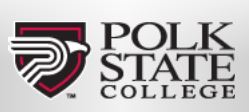Florida College System Civics Initiative
Best Practice Highlights
The Florida College System is dedicated to strengthening its institutional commitment to civic engagement, as the following Best Practices report demonstrates. The summaries below are capsules of some of the projects submitted by FCS colleges.
For the 2015 Raising the Bar Civics Literacy Conference, please click HERE.
 To view St. Petersburg College’s full report, please click HERE.
To view St. Petersburg College’s full report, please click HERE.
Citizenship Ambassador Initiative
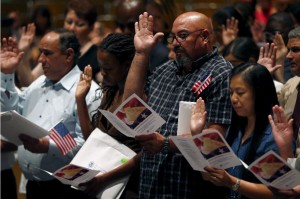 St. Petersburg College partnered with the United States Citizenship and Immigration Services (USCIS) to develop a workshop model for engaging students to help immigrant members of the community prepare for the United States Civics Exam in order to become U.S. citizens. The project is centered at SPC’s campus in Clearwater, which has a large and diverse population of immigrants. Student volunteers receive training to become Student Ambassadors, which includes lessons in leadership, cultural sensitivity, and the naturalization process. Professors prepare and deliver multi-media lessons in history and government to prepare candidates for the citizenship exam, and the Student Ambassadors lead one-to-one tutoring, working with the guests using USCIS worksheets. Through these lessons, applicants are exposed to all 100 possible questions on the USCIS Civics Exam.
St. Petersburg College partnered with the United States Citizenship and Immigration Services (USCIS) to develop a workshop model for engaging students to help immigrant members of the community prepare for the United States Civics Exam in order to become U.S. citizens. The project is centered at SPC’s campus in Clearwater, which has a large and diverse population of immigrants. Student volunteers receive training to become Student Ambassadors, which includes lessons in leadership, cultural sensitivity, and the naturalization process. Professors prepare and deliver multi-media lessons in history and government to prepare candidates for the citizenship exam, and the Student Ambassadors lead one-to-one tutoring, working with the guests using USCIS worksheets. Through these lessons, applicants are exposed to all 100 possible questions on the USCIS Civics Exam.
In its inaugural year in 2014, the initiative brought together participants from 28 countries to be involved in the citizenship exam workshops. As part of the initiative, SPC hosted a USCIS Naturalization ceremony during Constitution week with 100 people from 25 countries involved. As a Federal Judge administered the oath of allegiance to 100 new citizens, there were tears in the eyes of many in the audience. Instructors who volunteered their time to lead the workshops on weekends described the ceremony as one of the most moving experiences of their careers. Students likewise felt the emotion of the swearing-in ceremony. Said one, Vlora Bekteshi Neziri, “I’m so honored to do this, because it’s important to inspire people and give them hope.” After the ceremony, she added, “Not only are they celebrating but we are celebrating with them. It shows that the college is there for the community.”
Besides the satisfaction of having served others, the students gained a solid understanding of their country’s history and government, honed interpersonal relationship and speaking skills, raised awareness of and appreciation for cultural differences, and, perhaps most importantly, heightened appreciation of the value of their own privileges as American citizens.
Tags: Citizenship Ambassador Initiative, Best Practices, U.S. Citizenship and Immigration Service, U.S. Civics Exam, Naturalization Ceremony, SPC, Civics Initiative
- View Report: SPC Best Practices for Civic Engagement
- Read More: St. Petersburg Tribune Article
- Read More: SPC News article
For more information, contact:
Joseph Smiley, Ed.D
Dean, Social & Behavioral Sciences
St. Petersburg College
smiley.joseph@spcollege.edu
727-712-5783
Public Policy & Administration Baccalaureate Program
Future leaders ready to step into public service careers are being developed in one of St. Petersburg College’s newest and most successful baccalaureate programs, the Public Policy & Administration degree. PPA has grown exponentially in three years, from an initial enrollment of 12 students to having served over 250 students.
The program is built on a commitment to community service and civic engagement through using the best theoretical and practical applications. Course requirements send students out into the community to engage with public agencies on real-world issues. For example, in the State and Local Government and Public Policy course (PUP 3040), students are required to attend a local government meeting and select an agenda item of public interest. Students must then conduct a face-to-face interview with an expert in the discipline/area under review and perform a comprehensive policy analysis.
In the Policy Leadership course (PUP 3033), students must meet the requirements above but in addition they must present their findings to the government body about to make a policy decision on the agenda item under consideration. Case studies and class exercises are employed to help students develop skills in multi-party negotiations, conflict resolution, crisis and resource allocation and decision making.
For the Fall and Spring semester, the PPA faculty hosts a Public Policy Leadership Speaker Series Luncheon to give students an opportunity to meet and interact with government and professional leaders. Besides hearing first-hand how decision-making and leadership works in the real world, students are expected to engage in question-and-answer sessions with the speakers to demonstrate their public speaking, critical-thinking skills, and personal perspectives.
PPA students also have closely followed the implementation of the Project on Accountable Justice, a real-world study aimed at reforming Florida’s criminal justice system. (See Best Practice report elsewhere on this page). From inception of the executive committee up to the release of findings and recommendations in Fall 2014, this has been a real-world, real-time lesson in development of public policy.
Tags: Public Policy & Administration, Public Service Career, Leadership Speaker Series, Project on Accountable Justice, Best Practices, SPC, Civics Initiaitive
- View Report: SPC Best Practices for Civic Engagement
For more information:
Jeffery Kronschnabl
Instructor in Charge
Public Policy & Administration Baccalaureate Degree Program
St. Petersburg College
Kronschnabl.jeffery@spcollege.edu
727-394-6205
The Jane Till Non-Profit Start-up Series
Volunteering for a non-profit organization is an excellent way to make students aware of the importance of civic engagement. But St. Petersburg College is going beyond merely working for a non-profit. It is encouraging students to create their own 501(3)c charity organization.
The project, called The Jane Till Non-Profit Start-Up Series, is named for a much-beloved Ethics Professor at SPC who passed away in 2013. Its goal is to teach students the value of community service by actually creating their own charitable organization to fill a need that they themselves identify. Planned to launch in Spring 2015, it is a competitive project at four major SPC campuses: (St. Petersburg Gibbs, Clearwater, Seminole, and Tarpon Springs). The goal is to recruit at least 70 students for the inaugural competition.
Participating students will take part in an eight-week training program focused on developing, launching, and maintaining their community service project. Two-hour workshops led by experienced faculty will be held weekly at each of the four campuses. The campus-level winners will advance to a college-wide final and have an opportunity to compete for $5,000 in seed money to launch their charity.
The 2015 Series kicks off in late January; the instructional sessions begin in February and run through late March 2015. Individual campus competitions will be held in mid-April, and the college-wide final round at the end of that month. SPC Applied Ethics Faculty will work with students on laying the foundation for launching a non-profit organization, covering such topics as mission and vision statements, business plans, supervising volunteers, ethics in community service, setting up a board of directors, and so on. The instructional sessions include both instructional time and working sessions for participants to craft their vision.
The competitive portion of the program will be judged by community partners active in the non-profit arena, so students will receive feedback from experienced, sagacious experts.
The Applied Ethics Institute anticipates that this will be a recurring annual program held each spring semester.
- View Report: SPC Best Practices for Civic Engagement
- View Webpage: Jane Till Non-Profit Start Up Series Webpage
- Events: Jane Till Non-Profit Start Up Series Info Session
Tags: Non-profit, Start-up Series, Civics Education, SPC, Best Practices, Civics Initiative, Jane Till
For more information:
Susan Demers, Ph.D
Dean, College of Policy, Ethics and Legal Studies
St. Petersburg College
Phone: (727)791-2501
demers.susan@spcollege.edu
To read St. Petersburg College’s full Best Practices Summary, click HERE.
_______________________________________________________________
 To view Miami Dade College’s full report, please click HERE.
To view Miami Dade College’s full report, please click HERE.
Miami Dade College Civics Initiative Best Practices Report
Few if any civics literacy initiatives can achieve the benefits of a well-organized service-learning project. These are projects that combine learning goals and community service in ways that can enhance both student growth and the common good. Borrowing from language of the National Service Learning Clearinghouse, service learning is “a teaching and learning strategy that integrates meaningful community service with instruction and reflection to enrich the learning experience, teach civic responsibility, and strengthen communities.”
Indeed, the Center for Teaching at Vanderbilt University lists no fewer than 14 benefits to students from service learning, plus another dozen to faculty, the college and the community.
Within the Florida College System, Miami Dade College has developed a comprehensive template for service-learning projects over the past 20 years. It started with a Learn and Serve Grant from the Corporation for National and Community Service in 1994, and MDC has continued to build on that effort ever since.
MDC takes a systematic approach to developing service learning, starting with creation of an Advisory Committee of faculty, administrators, student and community partner representatives. MDC believes the initiative must provide an infrastructure of support resources to sustain the effort, including a physical space and dedicated staff. Without the infrastructure, says Josh Young, director of MDC’s Institute for Civic Engagement and Democracy, “these programs will remain small and on the margins of the institution.”
For the full report on MDC’s Service Learning Best Practice, click HERE.
Tags: Service Learning, Institute for Civic Engagement and Democracy, Miami Dade College, civic engagement.
- View Report: Miami Dade College Best Practices
For more information, contact:
Josh Young
Director, Institute for Civic Engagement and Democracy
Miami Dade College
jyoung@mdc.edu
305-237-7477
_______________________________________________________________
Santa Fe College: The Democracy Commitment
Best Practices Report
To view Santa Fe College’s full report, please click HERE.
Santa Fe College pursued civics literacy advancement on a variety of fronts during 2014. As a member of The Democracy Commitment since 2012, SFC has made a commitment to develop and expand programs, projects and curricula that engage students in civic learning and democratic practice – the mission of the national initiative called The Democracy Commitment.
As with many members of the Florida College System, Santa Fe College took full advantage of the 2014 mid-term elections as a platform on which to build civics education projects. These included hosting candidate forums for all seriously contested races in its marketplace, staging forums to explain the constitutional amendments and the Affordable Care Act, and hosting a faculty-led Watch Party for the Florida Gubernatorial Debate and – here’s a new twist – an Election Results Prediction Party on Election Day.
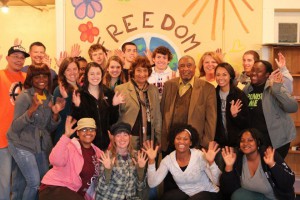 A project any college could copy: Alternative Spring Break. Santa Fe College sponsored a Spring Break trip to Selma, Ala., for the second year in a row to help students learn the history of the civil rights movement and non-violent conflict resolution, and to see landmarks of those historic events. A memorable experience: Students walking across the Edmund Pettus Bridge, site of the 1965 Bloody Sunday March in which more than 50 people were injured.
A project any college could copy: Alternative Spring Break. Santa Fe College sponsored a Spring Break trip to Selma, Ala., for the second year in a row to help students learn the history of the civil rights movement and non-violent conflict resolution, and to see landmarks of those historic events. A memorable experience: Students walking across the Edmund Pettus Bridge, site of the 1965 Bloody Sunday March in which more than 50 people were injured.
Santa Fe also took part in the FCS TurboVote project to promote student voter registration, and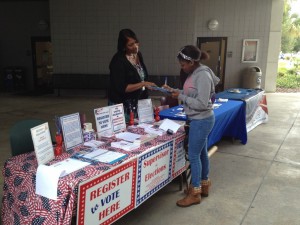 hosted a regional Florida Model Legislature session, as well as a Florida Model UN Conference. Santa Fe’s Model UN team also participated in a Southern Regional Model UN Conference. The college also collaborated with the local League of Women Voters chapter to provide students more opportunities to meet outstanding public figures.
hosted a regional Florida Model Legislature session, as well as a Florida Model UN Conference. Santa Fe’s Model UN team also participated in a Southern Regional Model UN Conference. The college also collaborated with the local League of Women Voters chapter to provide students more opportunities to meet outstanding public figures.
Tags: Service Learning, Institute for Civic Engagement and Democracy, Santa Fe College, Civic Engagement, Democracy Commitment, Model UN, Model Legislature
- View Report: Santa Fe College Best Practices Report
For more information, contact:
Vilma Fuentes, Ph. D.
Assistant Vice President, Academic Affairs
Santa Fe College
vilma.fuentes@sfcollege.edu
352-395-5030
_______________________________________________________________
Polk State College
Environmental Science: Rain Garden Project
To view Polk State College’s full report, please click HERE.
The Polk State College Science Department partners with the City of Winter Haven Natural Resource Management Division to involve students in hands-on, experiential community-based learning. Students enrolled in Introduction to Environmental Science participate in the rain garden project. City planners anticipate population growth during the coming decade and, with growth, an increased need for fresh water. The use of rain gardens to capture rainwater running off impermeable surfaces and enhance recharge of the local aquifer is central to the city’s water resource management plan. Environmental Science students work with scientists from the Natural Resource Management Division to select appropriate sites for their rain gardens and plan the physical attributes of their garden such as the area needed to accommodate anticipated runoff. Horticulturalists from UF/IFAS help the students develop garden plans and select appropriate native plants for their gardens.
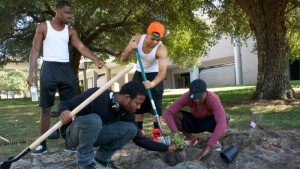
Students in Introduction to Environmental Science spent a Monday afternoon planting rain gardens around campus at Polk State Winter Haven.
The overarching goal of the project is help students understand how scientists think and solve problems as well as to help students begin to appreciate the power of scientific literacy. This is supported by the following goals:
- Use experiential and place-based learning to engage students in an introductory science class. This is a local problem that will directly affect these student’ quality of life.
- Work with local scientists who will model problem-solving skills in the field.
- Engage students in teamwork and conversations to help them internalize class concepts and learn to solve problems cooperatively.
- Use community-based learning to encourage students to understand the need for civic engagement as well as the need environmental ethics.
Students’ perception of the nature of science changed during the project. The local nature of the project promoted conversations about local issues and the utility of scientific literacy in solving local problems. Place-based, hands-on, and collaborative learning opportunities helped students internalized class concepts through application and conversations Students placed an emphasis upon the value of working with local scientists. Students said that working with “real-life scientists” who had experience with local resource management gave meaning to the project. They began to understand how scientists think about and approach problems. The students said that this encouraged them to think about the sustainability of water resources and how they could contribute to creating sustainable water resources. Students reported that the community-based learning focus of the project gave a purpose to the project. It made them feel good to give back to their community and it helped them to understand the importance of civic involvement. Community-based learning added an ethical dimension to the project. Students began to think about the power of a water ethic and the need for a water ethic.
For more information, contact:
Dr. Natalie Whitcomb, Professor of Earth Science
Polk State College
Winter Haven, Fl
nwhitcomb@polk.edu
(863) 292-3629
___________________________________________________________
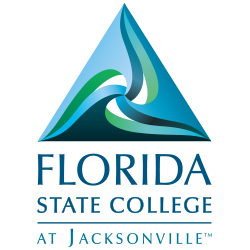 Florida State College at Jacksonville
Florida State College at Jacksonville
Advising Center Outreach for Voter Registration
To view Florida State College at Jacksonville’s full report, please click HERE.
Student Government Association officers on each of the five campuses of Florida State College at Jacksonville utilized the waiting areas of the Advising Centers to engage students and visitors in signing up to register to vote through TurboVote using iPads in both the fall and spring semesters. The SGA volunteers worked with the Advising Center Managers to determine peak times for optimal outreach. This proved to be helpful in occupying students who were waiting to be served as well as providing our SGA with a captive audience to demonstrate civic engagement in action. In addition, screen cloths printed with the link to the FSCJ TurboVote website were handed out to anyone who wanted to register (using their iPads or their personal electronic devices). This resulted in over 250 new voter registrations through TurboVote.
For more information, contact:
Kristy Synnott
Associate Director of Student Engagement
Florida State College at Jacksonville
South Campus
11901 Beach Blvd., U203
Jacksonville, Fl 32246
ksynnott@fscj.edu
904-646-2201
___________________________________________________________
 The Great Debate Series
The Great Debate Series
In an effort to enhance student awareness and knowledge of contemporary public policy issues, Eastern Florida State College (EFSC) initiated the “Great Debate” series on its Melbourne campus. Each semester, policy experts and advocates are invited to the college to engage in a Lincoln/Douglass style debate on topics such as the All-American Flag Act, Reforming the Public Defender system, Marijuana Legalization, and the 2016 Election.
For the Fall semester 2015, the topic of Marijuana Legalization in Florida was debated by drug policy experts Jeremey Bailee, an attorney from the law firm of Abbey, Adams, Byelick, and Mueller, and Jodi James, Director of the Florida Cannabis Action Network. In an energetic and lively exchange, both debaters held firm to their positions and presented compelling context and testimony to inform and persuade an auditorium packed with EFSC students, faculty, and staff members.
Attendees experienced the effective use of rhetoric between interlocutors in a formal debate setting. In addition, students were exposed to a high level of civility, an important component of increased civic engagement. John Cruz, an EFSC student, said that “this was one of the most heated arguments I have ever witnessed, yet both debaters treated each other with respect, which was quite refreshing.” In pursuing increased student involvement in public discourse and civic engagement, EFSC is committed to advancing respect and civility within the body politic.
At the conclusion of each Great Debate, students are invited to present questions and comments for the policy experts. Debaters have consistently commented that the student question-and-answer portion is one of the most rewarding aspects of the event. The audience members developed a dialogue with the presenters, continuing to explore issues and challenges associated with the topics. Eastern Florida State College anticipates continued success with the Great Debate series.
For more information, contact:
Phil Simpson, Ph.D
Provost, Titusville Campus
Eastern Florida State College
simpsonp@easternflorida.edu
321-433-5078
___________________________________________________________
We want to make the Best Practices website a helpful tool for all in the Florida College System who are working to expand civic engagement and civics literacy among students and the communities they serve. If you’d like to submit the Best Practices for your college, please click on “Submit a Post” in the Blog. The staff of the Institute for Strategic Policy Solutions will synopsize the report and add it to this webpage along with a link to the full report. For questions or more information please contact 727-394-6942.
Florida College System Best Practices Reports
- Broward College
- Chipola College
- College of Central Florida
- Daytona State College
- Eastern Florida State College
- Florida Gateway College
- Florida Keys Community College
- Florida Southwestern State College
- Florida State College at Jacksonville
- Gulf Coast State College
- Hillsborough Community College
- Indian River State College
- Lake Sumter State College
- Miami Dade College
- North Florida Community College
- Northwest Florida State College
- Palm Beach State College
- Pasco-Hernando Community College
- Pensacola State College
- Polk State College
- Santa Fe College
- Seminole State College of Florida
- South Florida State College
- St. Johns River State College
- St. Petersburg College
- State College of Florida, Manatee – Sarasota
- Tallahassee Community College
- Valencia College




